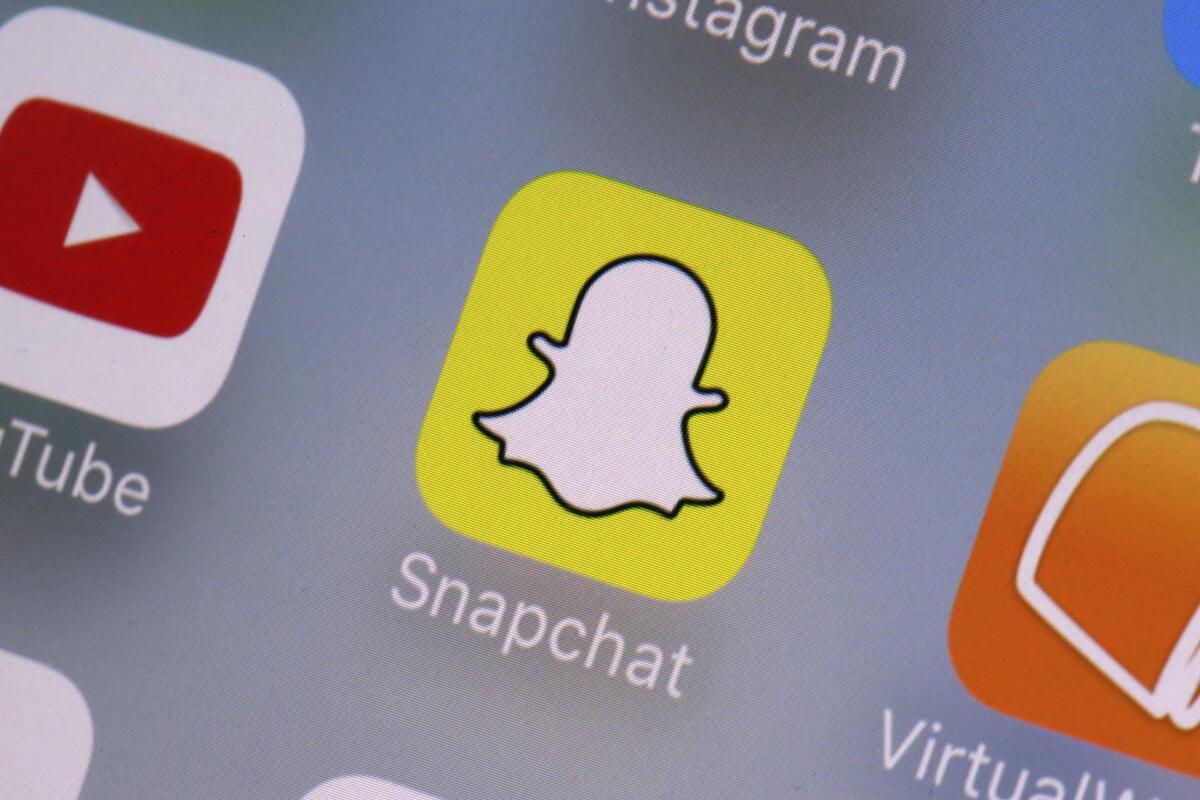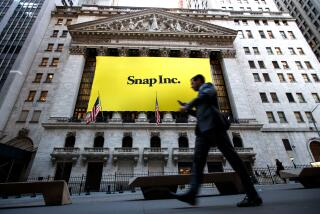Snap beats expectations on user growth, revenue

- Share via
Snap Inc. reported gains in revenue and users that exceeded analysts’ estimates, as the company’s investments in content and creative tools lured young people and the advertisers trying to reach them. Its shares soared.
Second-quarter sales more than doubled to $982.1 million, the company said Thursday. That dwarfed the $846.9-million average analysts’ estimate. Snapchat, the mobile app for sending disappearing messages and watching video content, had 293 million daily active users in the second quarter, beating analysts’ expectations for 290.72 million, according to data compiled by Bloomberg.
It’s “hard to see anything that’s not firing on all cylinders,” said Mark Shmulik, a senior technology analyst at Sanford C. Bernstein, who added that the company will also benefit when people return to socializing in person as the economy reopens.
Snap has benefited from a digital advertising and e-commerce market boom during the pandemic as companies of all sizes turned to social media platforms to reach customers who were stuck at home to avoid the spread of COVID-19.
Like its social media rivals, the company has also been investing in compensating creators on its app who post entertaining videos, giving users a reason to return to the app frequently.
As some parts of the world reopen and recover, Snap Chief Executive Evan Spiegel expects users may use the app not just to cure their boredom but also to add life updates to their Snapchat Story — the posts that disappear in 24 hours.
“While it is unclear when these restrictions will end and how user behavior will evolve, we are seeing stabilization and early recovery in Story posting as some communities are reopening,” Spiegel said in prepared remarks. “We are cautiously optimistic that this will lead to increased time spent watching Stories from friends as the world begins to open up.”
From TikTok tarot to remote reiki, COVID-19 drove mediums, clairvoyants and other “spirit workers” online.
Snap warned that the company may not be able to predict the effect on its revenue from either the continued pandemic or Apple Inc.’s changes to iPhone permissions.
In a recent software update, Apple started asking iPhone users to let each app know whether they were willing to be tracked for advertising purposes. Snap said that its users were opting into tracking more often than some of the industry’s reported averages but that it won’t see the full effect of the change until the third quarter or later.
Across the industry, people are opting to give apps permission to track their behavior just 25% of the time, according to Branch, which analyzes mobile app growth. Less tracking means it’s harder for social media companies such as Snap to tailor ads, putting revenue at risk.
Chief Business Officer Jeremi Gorman said iPhone users are taking time to adopt the update. “This has given us more time with advertisers to navigate the transition but also means the effects of these changes will come later than we initially expected,” she said.
Bloomberg Intelligence analyst Mandeep Singh attributed Snap’s revenue growth to higher bidding by advertisers for placements on the app. Advertisers “really bid up the prices of the ads because they could see the ROI,” or return on investment, he said in an interview.
The Santa Monica company reported a net loss of $151.7 million, compared with the $276.9 million net loss analysts expected. The company projects that daily active users will climb to 301 million and that revenue will grow 58% to 60% in the third quarter. Snap rose as much as 10% to $69.49 after closing at $62.97. The shares have gained 25.8% so far this year.
In the long run, Snap is also aggressively investing in augmented reality as part of its plan to deliver revenue growth of more than 50% for several years. More brands are turning to Snapchat to experiment with more customizable shopping experiences that allow customers to try on clothes, accessories or beauty products on their phones.
Snap has made some acquisitions to bolster the technology, including a $124.4-million purchase of Fit Analytics, a tech company that uses machine learning and webcams to size products to potential buyers. Snap also improved the visibility of the app’s Scan feature, which gives users the ability to scan an outfit and receive recommendations to buy similar looks from hundreds of brands.






